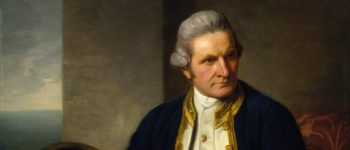1769: Cook Rediscovers New Zealand
October 8, 2019
By AHNZ
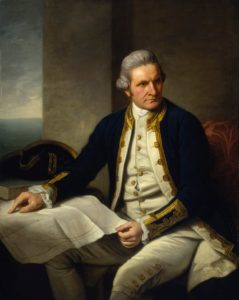 Today in history, 8 October, 1769, Lieutenant James Cook discovered New Zealand for his people. The Dutch had already done so and perhaps the Arabs as well. As Reeves says, Cook found New Zealand a line on the map and left it an archipelago.
Today in history, 8 October, 1769, Lieutenant James Cook discovered New Zealand for his people. The Dutch had already done so and perhaps the Arabs as well. As Reeves says, Cook found New Zealand a line on the map and left it an archipelago.
At 2pm, Cook and a party landed at what the navigator hoped to call ‘Endeavour Bay‘ after their ship. Instead, it remains to this day ‘Poverty Bay’ because of what happened next.
Honour Culture New Zealand
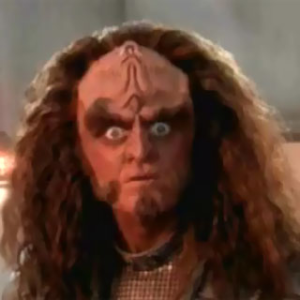 Cook’s landing party saw there were dwellings along this shore with smoke rising up here and there and set out to make First Contact. Four boys were left in charge of the bigger boat (pinnace) while the men took the littler (yawl) further up the Turanganui River.
Cook’s landing party saw there were dwellings along this shore with smoke rising up here and there and set out to make First Contact. Four boys were left in charge of the bigger boat (pinnace) while the men took the littler (yawl) further up the Turanganui River.
What Cook’s crew did not know was that the New Zealanders were steeped in a savage and hardcore Honour Culture. It was a dog-eat-dog world where the locus of society revolved around revenge and social standing. Abstract institutions like making friends or trading goods did not compute. There was guile and trickery but there was no intimacy or respect. Might made right among these warlike people. They lived behind defended fortifications, afraid of their neighbours. Going outside their Safe Spaces was done in armed sorties on foot and in canoes (waka.) Later on in Cook’s visit his Maori guests were terrified of being dropped back to a part of the Poverty Bay coast outside the narrow corridor of safety. It was such a violent hot-spot that they knew they’d be slaughtered and eaten by their countrymen if caught.
“They were so generous as to tell us they would come and attack us in the morning.”- Captain Cook upon encountering Maoris, 1769
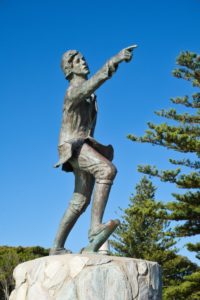 Unsuspectingly, Cook’s crew wandered into this hot spot on what should have been a day of joy for two cultures. Back at the beach, the kids were ambushed by armed Maori warriors running at them. One of the boys was probably Nick Young who first spotted New Zealand a couple of days earlier for whom Cook named ‘Young Nick’s Head’. Seeing that the boys were about to die, one of the crew fired warning shot overhead but it did not perturb the attackers who kept on running with spears in hand. ‘Nick’ and the other Endeavour boys quickly launched the big boat on their own and paddled upstream to the protection of the men. Still they were pursued by the men running along the bank of the Turanganui intent on killing the children. Just before a spear was thrown, Endeavour’s men got there first and put a shot into the offending Maori putting an end to the chase. As Cook himself appeared, the New Zealanders backed away dragging their dead man with them. The Englishmen decided to call it a day too, regrouping back at Endeavour.
Unsuspectingly, Cook’s crew wandered into this hot spot on what should have been a day of joy for two cultures. Back at the beach, the kids were ambushed by armed Maori warriors running at them. One of the boys was probably Nick Young who first spotted New Zealand a couple of days earlier for whom Cook named ‘Young Nick’s Head’. Seeing that the boys were about to die, one of the crew fired warning shot overhead but it did not perturb the attackers who kept on running with spears in hand. ‘Nick’ and the other Endeavour boys quickly launched the big boat on their own and paddled upstream to the protection of the men. Still they were pursued by the men running along the bank of the Turanganui intent on killing the children. Just before a spear was thrown, Endeavour’s men got there first and put a shot into the offending Maori putting an end to the chase. As Cook himself appeared, the New Zealanders backed away dragging their dead man with them. The Englishmen decided to call it a day too, regrouping back at Endeavour.
“…not until they heard warning shouts from the sailors at the mouth of the river, where the pinnace had been left, that they saw, to their alarm, some armed savages running toward them from the edge of the bush..”- Reed
“…a Maori party approached the Endeavour’s pinnace ashore on the bank of the Turanganui River and ceremonially challenged the crew…”- King
Day 2
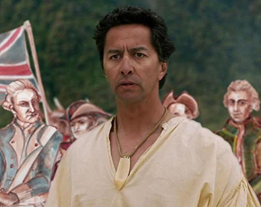 Cook and his crew now had had a taste of what world they had landed on. Poverty Bay was a cross between a supermarket and several games of murder-hockey all going on in the same place and time and they had stumbled onto the field. This time, Cook returned with all 3 of the ship’s boats and well armed and with his marines for protection. The children, I presume, couldn’t go ashore this time because it wasn’t safe.
Cook and his crew now had had a taste of what world they had landed on. Poverty Bay was a cross between a supermarket and several games of murder-hockey all going on in the same place and time and they had stumbled onto the field. This time, Cook returned with all 3 of the ship’s boats and well armed and with his marines for protection. The children, I presume, couldn’t go ashore this time because it wasn’t safe.
Tupaia (right) was Cook’s biggest gun of all and was deployed on the beach on day 2. The shouts and threats of fifty armed Maoris amassed on the other side of the river was calmed by this priest’s words. When the Maoris invited Cook’s people to trade with them it looked like things were going to work out OK after all. A lone warrior swam over but snatched the chief astronomer’s, Charles Green’s, sword off him which started up another nasty stand-off.
“…another local was killed for snatching a sword from an Englishman and brandishing it menacingly.”- King
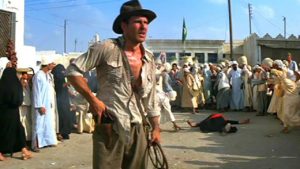 Like Indiana Jones, Joseph Banks (scientist) put a bullet in the (first ever?) Maori swordsman and the ship’s surgeon, William Monkhouse, (doctor) proclaimed Time Of Death with a second shot¹. Increasingly being outnumbered by hostiles, Tupaia threw in the towel saying only death awaited the crew on this beach. The marines laid down cover fire (killing 3 Maoris) as Cook and his men escaped once more to Endeavour full of sadness for what might have been.
Like Indiana Jones, Joseph Banks (scientist) put a bullet in the (first ever?) Maori swordsman and the ship’s surgeon, William Monkhouse, (doctor) proclaimed Time Of Death with a second shot¹. Increasingly being outnumbered by hostiles, Tupaia threw in the towel saying only death awaited the crew on this beach. The marines laid down cover fire (killing 3 Maoris) as Cook and his men escaped once more to Endeavour full of sadness for what might have been.
Canoe Encounter
No more ashore, the last encounter in this first chapter of contact happened between Cook in one of his boats and returning Maori fishermen in theirs. This was about 2 weeks after first arriving in New Zealand and it was another bad job…
“Thus ended the most disagreeable day my life has yet seen- black be the mark for it and heaven send that such may never return to embitter future reflection.”- Joseph Banks
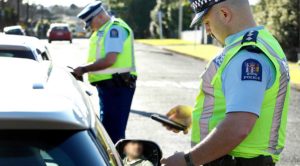 Like some modern American Policemen, Cook and Tupaia tried to make the Maori’s “pull over.” It was now clear that the only language being spoken was force so this time the English would try it the Maori’s way. It was supposed to play out just like a police car flashing its lights and siren (firing shots overhead in this case) and the other vehicle submitting to inspection. Yet even this typical Western institution was too abstract for an Honour Culture who had never known such a script let alone submitted to one.
Like some modern American Policemen, Cook and Tupaia tried to make the Maori’s “pull over.” It was now clear that the only language being spoken was force so this time the English would try it the Maori’s way. It was supposed to play out just like a police car flashing its lights and siren (firing shots overhead in this case) and the other vehicle submitting to inspection. Yet even this typical Western institution was too abstract for an Honour Culture who had never known such a script let alone submitted to one.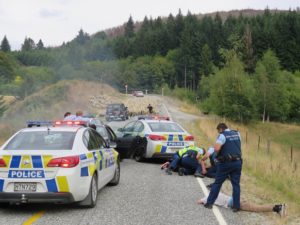
The routine Police Stop became a navel battle. The superior canoeists, in my opinion anyway, could have left Cook’s people in the dust in an escape. Instead, they were un-intimidated and un-frightened, cursing abuse as they turned to confront the challenger. Sources differ but Reed says the Maoris made an attack…
“The chiefs rapped out a command; the canoes were rapidly turned; with fierce cried the warriors went unhesitatingly to the attack of the strange craft. The whites were outnumbered; the canoes were about to ram the boat; there seemed nothing for it but to fire amongst them.”- Reed
“..had I the least thought of their making any resistance I would not so much as have looked at them…once alongside of them we must either have stood be knocked on the head or else retire and let them gone off in triumph…”- Cook (redacted log²)
Despite all the remorse in the world it was too late by this point because the other boat did not submit but escalated. Cook must have been wondering what you have to do to please these damn Honour Culture people? You try peace, they try to kill you. You try showing force, they try to kill you for that too! Now the would-be policemen either had to fight or submit. Experience showed that to submit would mean death. Even if Cook kept a Dignity Culture ‘stiff upper lip’ to the sticks and stones of abuse and there had been no attack it would have poisoned his attempts to gain and keep credibility in an Honour Culture world. At that point, Cook was still trying to stay and establish a relationship so he did the only thing he could do. Two or three more Maori were killed, three became captives that evolved into happy guests.
Cook and his crew found that they didn’t have the stomach for this Honour Culture game now. They hated what this situation had forced them to become. The dominant strategic interaction when going up against Honour Culture is to show strength and never apologise as the Endeavour’s crew recognised. Future Governor Captain Robert FitzRoy would refuse to learn that lesson but George Grey knew it as well as Cook and what’s more had the cold-blooded guts to carry it out.
“His beautiful death was the only glorious event to take place in his entire lifetime… he was an imperialist barbarian thief and colonist. His death was beautiful, in the sense that it was extremely well deserved and he cooked himself (a lesson for the imperialist colonizers, don’t fuck with the ruling chief) Captain Crook didn’t discover shit in New Zealand Also, fuggg the Doctrine of Discovery and Manifest Destiny, you’d have to be delusional to believe that shit. Nobody has the right to conquer or claim He is not a “hero” or a “saviour”. He and his villainous associates brought no good to Aotearoa We would have been better off without that vile creature”- Commenter to AHNZ
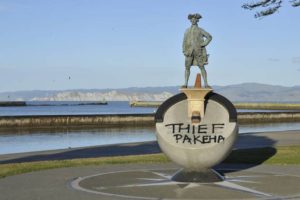 Lieutenant Cook and his crew did not drive their ships to new lands to fight the horde, and sing and cry, to be overlords. Like Capitaine Marion du Fresne to follow (1772) they belonged to a Dignity Culture or even Victimhood Culture who wanted peaceful exploration. They wanted to see the New Zealanders as noble savages in need only of understanding and ready for friendship. Instead the Westerners were attacked, the French slaughtered. For most of our history this has been well-remembered and Cook’s contributions and triumphs commemorated or even celebrated. During Victimhood Culture days, however, these first fateful days are spun to read as if he were a villain.
Lieutenant Cook and his crew did not drive their ships to new lands to fight the horde, and sing and cry, to be overlords. Like Capitaine Marion du Fresne to follow (1772) they belonged to a Dignity Culture or even Victimhood Culture who wanted peaceful exploration. They wanted to see the New Zealanders as noble savages in need only of understanding and ready for friendship. Instead the Westerners were attacked, the French slaughtered. For most of our history this has been well-remembered and Cook’s contributions and triumphs commemorated or even celebrated. During Victimhood Culture days, however, these first fateful days are spun to read as if he were a villain.
What is written above is as disruptive to the mainstream narrative as it is possible to be these days. The Anarchist History of New Zealand is about finding and telling the truth about our history rather than conforming. Funny thing is, what was once considered conservative and mainstream and obvious is today a radical statement.
—
1 …into the wounded Maori: killing him
2 Ref. Captain Cook; p32 Frank McLynn (2011)
Ref. The Story of New Zealand; A.H. Reed (1945)
Ref. The Penguin History of New Zealand; Michael King (2003)
Image ref. Nick Young statue; travellingwithmynikon.com
 Like Comment Share
Like Comment Share

